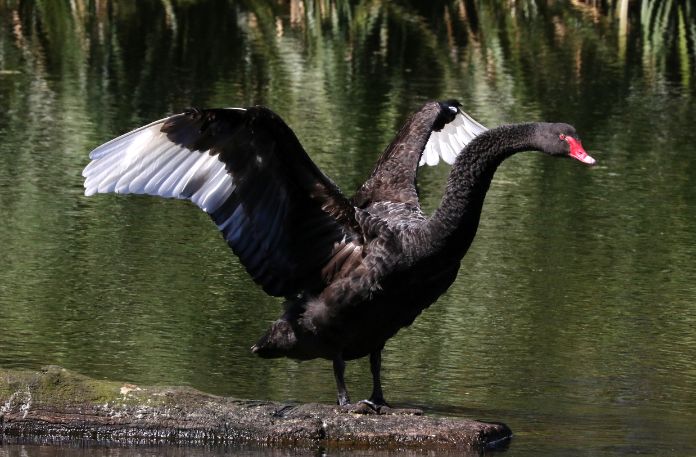Today’s Bird of the Day, the black swan, is included in the 60th anniversary edition of Birds, a collection of poems by Judith Wright.
Wright was one of Australia’s most celebrated poets and one of only two to be considered for the Nobel Prize.
Birds was first published in 1962 and republished this year by the National Library of Australia.
The poems in Birds commemorate Wright’s love of birds while exploring a gamut of human experiences – delightful, humorous and sorrowful.
To celebrate her as both writer and environmentalist, and to more fully reveal the centrality of birds in Wright’s imagination, the new edition contains six additional poems drawn from her work.

Wright’s poem “Birds” begins:
“Whatever the bird is, is perfect in the bird.
Weapon kestrel, hard as a blade’s curve,
thrush round as a mother or full drop of water,
fruit-green parrot wise in his shrieking swerve –
all are what bird is and do not reach beyond bird.”
It continues with the writer “torn and beleaguered by my own people” and their wish to save her and turn her into the ways of other people. It concludes with the poet’s desire to “be simple to myself as the bird is to the bird”.
In a personal introduction, Wright’s daughter Meredith McKinney said the poems in the collection not only offered intimate portraits of many of the birds that were dear to her, but each poem in its varied way also reached to touch each varied bird’s “perfection”.
“They are the poet’s way of becoming one with the creatures she loved.”
In “Black Swans”, Wright describes how:
“Black swans shadowed the blaze of moon
as they came curving down the sky.
On hills of night the red stars burned
like sparks blown where the wind is high.
On rushing wings the black swans turned
sounding aloud their desolate cry.”
McKinney said for all Wright’s delight in birds, her vision of their world and her own was shaped by a darker knowledge. “The experiences of cruelty, pain and death are as inseparable from the lives of birds as they are from those of humans.”
She said Wright’s final poem in the original volume, “Extinct Birds”, offered, “a sorrowing and clear-sighted gaze turned on the terrible damage we have done and continue to do to our world, even as we love it”.
_______________
Follow @southsydneyherald on Instagram to see our birds of the day and learn about protecting urban biodiversity.





